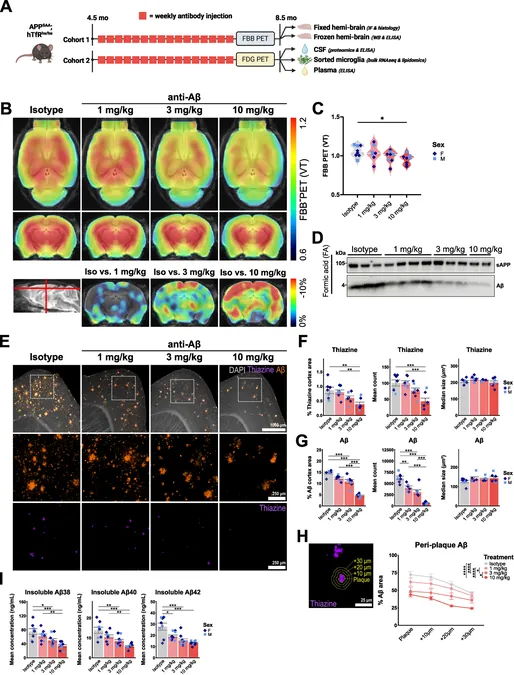
Breakthrough in Alzheimer's Treatment: Early Anti-Aβ Therapy Reduces Brain Inflammation!
2025-08-19
Author: Siti
Transformative Insights from New Research on Alzheimer's Disease
In a groundbreaking study, researchers have found that early intervention with anti-Aβ immunotherapy can significantly mitigate microglial activation in mice without causing long-term cell exhaustion. This innovative approach focuses on tackling the underlying causes of Alzheimer's disease (AD) before more severe symptoms manifest.
Mice Study: A Glimpse into Alzheimer's Pathology
The experiments, conducted with approval from the Ethical Review Board, used APP-SAAki/ki x hTfRki/ki mice. These specially bred mice exhibited early signs of amyloidosis, a critical component in AD progression. The research began by assessing the deposition of amyloid plaques over various ages, revealing that early plaque formation occurs as early as 3 months.
The Wonder of Aducanumab: A Potential Game-Changer
At the core of the study was Aducanumab, a chimeric anti-Aβ antibody. Mice were treated with varying doses of this therapeutic, showing promising outcomes in plaque reduction. Notably, mice receiving the highest dosage (10 mg/kg) demonstrated remarkable decreases in amyloid accumulation.
Groundbreaking Imaging Techniques to Track Treatment Effects
The researchers employed advanced imaging techniques, like PET scans, to assess amyloid deposition and brain metabolism post-treatment. Results indicated a direct correlation: higher doses of Aducanumab led to significantly reduced amyloid plaque formations.
No Increase in Side Effects: A Major Relief?
Concerns regarding microbleeds associated with anti-Aβ therapies were addressed. Surprisingly, the study showed no significant increase in these side effects in treated mice, suggesting that chronic anti-Aβ treatment might not exacerbate vascular complications, contrary to prior assumptions.
Unlocking CSF Proteomics: Biomarkers of Promise
Changes in cerebrospinal fluid (CSF) proteome revealed significant reductions in immune activation markers and changes in neurodegenerative proteins after the anti-Aβ treatment. These findings indicate a reduction in the active neuroinflammatory state associated with plaque presence.
Revolutionizing Future Alzheimer's Therapies
This study illuminates the potential of anti-Aβ therapies when administered early in the course of Alzheimer's disease. Enhanced microglial function coupled with reduced plaque formation offers a hopeful avenue for disease management.
Next Steps: A Long-term Impact on Alzheimer's Treatment?
The results highlight a need for further investigation into the long-term effects of anti-Aβ treatments and their impact on microglial health, especially in early-stage Alzheimer's patients. These findings suggest a pivotal shift in how we approach AD therapies, with the possibility that early intervention may open doors to better patient outcomes.
Stay Tuned: The Fight Against Alzheimer's Continues!
As researchers continue to explore innovative treatment strategies, the hope remains that therapies like Aducanumab can pave the way for effective interventions that not only manage symptoms but potentially alter the disease trajectory.




 Brasil (PT)
Brasil (PT)
 Canada (EN)
Canada (EN)
 Chile (ES)
Chile (ES)
 Česko (CS)
Česko (CS)
 대한민국 (KO)
대한민국 (KO)
 España (ES)
España (ES)
 France (FR)
France (FR)
 Hong Kong (EN)
Hong Kong (EN)
 Italia (IT)
Italia (IT)
 日本 (JA)
日本 (JA)
 Magyarország (HU)
Magyarország (HU)
 Norge (NO)
Norge (NO)
 Polska (PL)
Polska (PL)
 Schweiz (DE)
Schweiz (DE)
 Singapore (EN)
Singapore (EN)
 Sverige (SV)
Sverige (SV)
 Suomi (FI)
Suomi (FI)
 Türkiye (TR)
Türkiye (TR)
 الإمارات العربية المتحدة (AR)
الإمارات العربية المتحدة (AR)